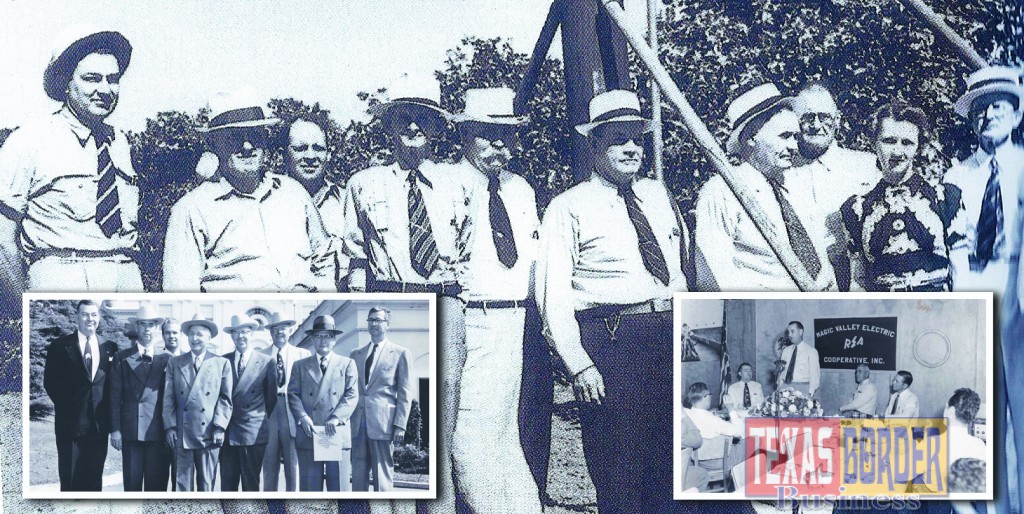
This was just the beginning as the first pole was set by Magic Valley Electric Cooperative’s rural electric system. The ceremony took place in 1938. The first pole was set at Mile 5 west and 12-1/2 north of Weslaco, which was destined to be followed by 24,999 more poles, stretched out over 2,000 miles of lines during the ensuing 30-years.
Present for the historic occasion were (front, left to right): J.E. Wilder, V.W. Bernard, Judge B.H. Oxford, George McCain, R.M. King, George Darnell, Helen Cronkite Dickman, and L. H. Henry. Back row: Mr. Griffin (left) and W.J. McKnight.
Wilder was the cooperative’s first manager and Darnell was the president of the board and King was secretary/treasurer, a position that he kept more than 30 years.
—-Photo on the left
MVEC Board Members in 1940’s
—-Photo on the right
Lyndon B. Johnson addressing MVEC Board Members in 1940’s…
By Roberto Hugo Gonzalez
As originally published by Texas Border Business newsprint Edition. This articles updated March 2014, the company is celebrating 77 years in service this year.
When people organize for a good cause, they can change the world. Such was the case of the people that created Magic Valley Electric Cooperative (MVEC), which brought electricity to the rural Rio Grande Valley for the first time.
By bringing electricity to our area, they not only changed the world for the betterment of thousands of residents, but also accelerated progress to remote and unpopulated areas.
Most of the country’s urban areas had been electrified for decades, rural areas were in the dark well into the 1930s. Without electric power, life proved to be difficult in the Rio Grande Valley. In fact, people became accustomed to lighting kerosene lamps, cooking on wood–burning stoves, bathing in the kitchen sink and spending all day doing laundry.
MVEC constructed and energized its first 75 miles of line for 4,125 members in 1938. Through the efforts of member owned electric cooperatives like MVEC working nationwide, almost half of the homesteads in the U. S. had electricity by 1942. Within 10 years, the number had reached almost 100 percent.
This year, Magic Valley Electric Cooperative, Inc. is celebrating 75 years of providing electric service. In 1937, local farmers and ranchers from the “Magic Valley” came together, pooling their own money and utilizing a loan from the federal government, through the Rural Electrification Act, to form the local Co-op.
These founding members brought electricity to rural areas of the Rio Grande Valley for the first time, and the rest is history. “We give thanks to our founding members’ dedication to bring the modern world to rural areas of the Valley,” said MVEC Board President, Dr. Martin E. Garcia during the 75th annual membership meeting in April of this year. Their dream of a better life will guide us for the next 75 years,” he stated.
Today, MVEC has grown to include more than 87,000 members and 4,768 miles of energized line. It is the 3rd largest electric cooperative in Texas and 22nd largest in the nation. TBB
How Electric Co-Ops Energized Rural America
1844 Cooperative principles established in Rochdale, England
1909 Country Life Commission recommends creation of electric cooperatives to power rural areas
1935 President Franklin D. Roosevelt creates federal Rural and Electrification Administration (REA) by executive order.
1936 First REA project in Texas energizes 110 farm homes in Bartlett, Texas.
1937 53,000 total miles of co-op lines constructed throughout the rural United States.
1940 180,000 miles of rural lines built with another 80,000 underway.
1941 Texas Electric Cooperatives, the statewide association of electric cooperatives, established to represent the interest of the co-ops and their members
1942 National Rural Electric Cooperative Association formed to represent co-op interest nationally.
1949 More than one million rural farm homes energized. Roughly 184,000 miles of rural line constructed this year alone.
1950 Willie Wirehand, a mascot for electrical cooperatives debuts and was named after the “Hired Hand” electricity gave to farmers.
1962 Electric co-ops serve fine medium Americans.
1994 REA renamed Rural Utilities Service.
2009 NRECA/USAID partnership connects more than 100 million people to electricity in 42 nations.
2010 74 years after the creation of REA, 900–plus co-ops in 47 states serve 17 million homes and businesses.
2012 People around the globe joined the United Nations in celebrating 2012 as the international year of cooperatives. Texas electrical cooperatives serve more than 2 million homes and businesses across the state through a network of 318,000 miles of line.
















